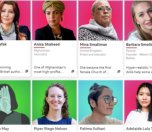Click to read the article in Turkish
US actress and United Nations (UN) Goodwill Ambassador Angelina Jolie has interviewed novelist Elif Şafak from Turkey about the country's withdrawal from the İstanbul Convention by a Presidential decision.
In her interview for the TIME magazine, she has started by announcing, "The Turkish government claimed that the treaty was being used to 'normalize homosexuality' and undermine Turkish family values."
Then, Jolie has moved on to ask Elif Şafak about what this withdrawal means for women's rights in her motherland.
"I think this is a major setback, which will have catastrophic consequences for women, for children, and for the LGBTQ community," Elif Şafak has answered this question, briefly adding the following:
"The Istanbul Convention is the most progressive international treaty we have that protects anyone who is vulnerable to violence.
"It provides legal networks, it opens shelters, it raises awareness, it protects victims and prevents violence—if it is implemented.
"Turkey was the first country to sign and ratify this treaty, but now it is abandoning it. It breaks my heart, because it is happening at a moment when femicide cases are increasing. There was already an escalation in domestic violence cases in Turkey. At a time when women needed protection the most, the government is doing the exact opposite."
Argument of 'family values'
Jolie has said, "Rollbacks of women's rights are often justified by those responsible as a defense of family values. As though it is better for violence to remain behind closed doors. What's your answer to this?"
To this, Şafak has answered: "It is not a private issue if someone is hurt, if someone is suffering abuse. It cannot stay behind four walls. We need to break those walls of silence. No one can be happy in a house where there is abuse, where there is a violence.
"Then there are these incredibly problematic laws in many countries which reduce the sentences given to rapists, should they agree to marry their victims, as if they are doing their victims a favor."
When Jolie has asked for an example, Şafak has said:
"One case immediately comes to mind—the trial started recently in Turkey. A young Kurdish woman was raped by her husband's brother. She was brave, she refused to be silent about it. She wanted to take the perpetrator to court, but in court she was not given a Kurdish-speaking interpreter. She could not tell her own story. And then her husband came and he killed her, because she was ruining the family's honor.
"This says so much about the intersectional layers of oppression, for minority women, women with disabilities, transgender women, indigenous women. The whole system favors the perpetrators and punishes the victims over and over and over again."
Click here to read and watch the full interview
What happened?
Turkey has withdrawn from the İstanbul Convention with a Presidential decision published in the Official Gazette on March 20, 2021.
The decision in question said that "the Council of Europe Convention on Preventing and Combating Violence Against Women and Domestic Violence, which was signed by Turkey on May 11, 2011 and approved with the Cabinet Decree no. 2012/2816 on February 10, 2012, shall be terminated on the part of Turkey as per the Article 3 of the Presidential Decree no. 9."
Following this Presidential decision published at midnight, several social media users, women's rights defenders, lawyers and politicians, denounced the decision, recalling that the convention was unanimously approved at the Parliament and stressing that it is not possible for Turkey to withdraw from an international convention with a Presidential decision.
After the Presidential decision pulling Turkey out of the İstanbul Convention was met with criticisms and objections in both Turkey and around the world, the Communications Directorate of the Presidency released a written statement about the issue on March 22.
"As known, Turkey was the first signatory to the Istanbul Convention," the statement noted, arguing that the "İstanbul Convention, originally intended to promote women's rights, was hijacked by a group of people attempting to normalize homosexuality – which is incompatible with Turkey's social and family values. Hence the decision to withdraw."
The protests are still ongoing. (HA/SD)







